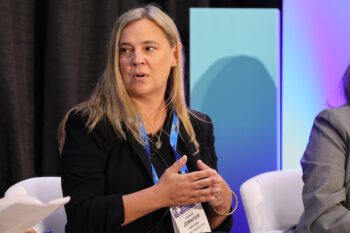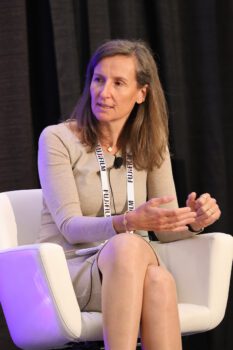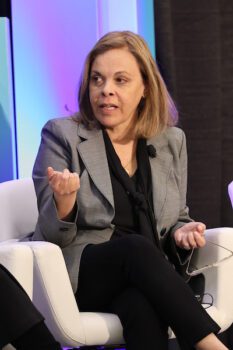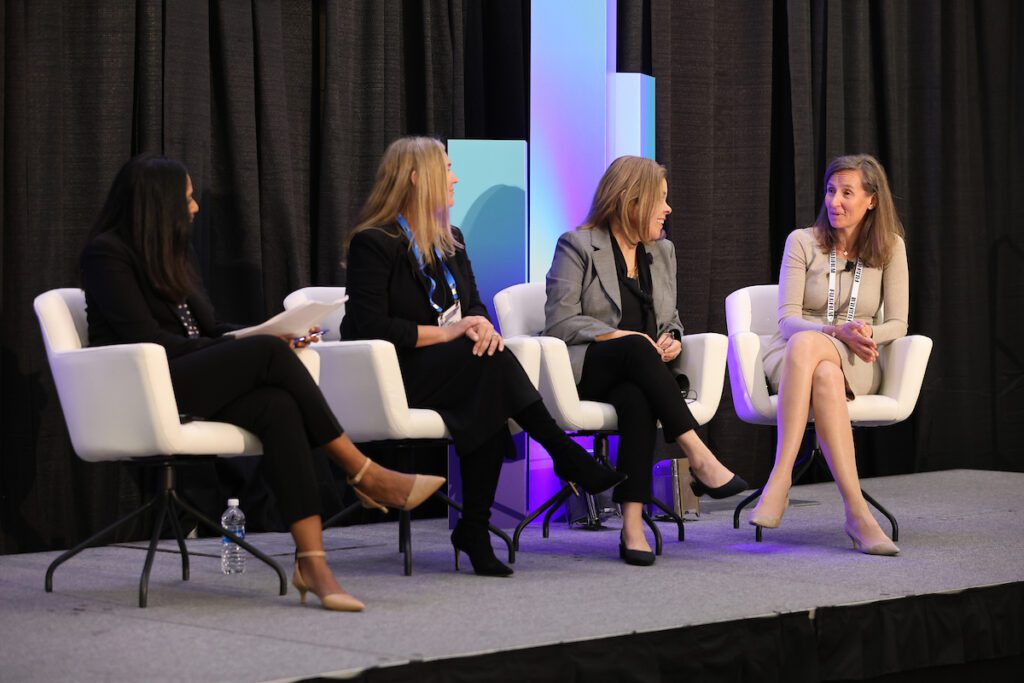We have gene editing because of women—after all, Nobel Laureates Jennifer Doudna and Emmanuelle Charpentier discovered CRISPR Cas9, which kickstarted the gene-editing revolution.
But while women have been in gene editing “from the start,” as Luisa Salter-Cid, Chief Scientific Officer of Pioneering Medicines at Flagship Pioneering, said, we still need more women in leadership positions at the biotech industry’s leading gene-editing companies.

“There definitely could be more women,” agreed Jen Nielsen, Vice President of in vivo at CRISPR Therapeutics.
They joined an all-women panel, Women at the Crossroads of Gene Editing, on June 8, the final day of the 2023 Biotechnology Innovation Organization (BIO) International Convention.
In addition to being, arguably, founded by women, another reason why we may see more women in the field is that gene therapy and gene-editing platforms are relatively newer technologies, developed at a time when there is already less disparity than there was 20 years ago, noted Salter-Cid.
“But we’re still not there yet,” she said.
Women kickstarted the gene-editing revolution, but we still need more women in leadership positions at biotech's leading gene-editing companies. Hear what Luisa Salter-Cid from @PioneeringMeds of @FlagshipPioneer had to say at #BIO2023.https://t.co/FS7QZ7coxh pic.twitter.com/7FG5BszT9e
— I Am Biotech (@IAmBiotech) June 16, 2023
And it matters when it comes to bringing these groundbreaking therapies to patients. “Diversity is important to make the right decision, have the right strategy,” said Anne-Virginie Eggimann, Chief Regulatory Officer at Tessera Therapeutics.
Gene editing is a ‘paradigm shift’

We have a long way to go in terms of communicating what the technologies are, and their potential, said moderator Cynthia Isaac, Managing Director of Syneos Health. “How does the healthcare ecosystem have to change to be able to accommodate such a paradigm shift?” she asked the panelists.
The Food and Drug Administration (FDA) is “stepping up,” said Eggimann—and with the platform approach, innovators hope several products could be developed at once without the need to do multiple trials. She expects we could see “trials where you group many rare diseases together,” and hopes the FDA will create a Center of Excellence such as the one for oncology.
“The one-and-done curative therapy is so new and so different,” that it’s hard to understand, especially when we’re so used to talking about treatments, said Nielsen. This presents a paradigm shift for providers, opinion leaders, and patients, as well as payers: “A one-time cure up front is going to be more beneficial than a life-long treatment.”
The panel discussed the importance of communicating clearly with patients in particular.
Patient advocacy groups are “the way to really reach out to patients,” noted Salter-Cid. Patients and advocates want the details about the platforms, and it’s important to communicate them in a way that doesn’t feel like a sales pitch.
What women bring to the bench

While panelists agreed more women need to be brought into the sector’s leadership ranks, they also agreed that the characteristics that make a good leader in the field are the same for women and for men.
“Do you have vision and are you willing to take risks?” asked Nielsen. The willingness to take a risk is especially critical in gene editing, being a newer field.
“Resilience is important,” added Salter-Cid. “Gene therapy is moving so fast.”
Panelists also agreed on the importance of mentorship—and that women leaders should reach out and find mentees. This includes women—but also people who aren’t necessarily exactly like them and men, as well as thinking about “reverse mentorship” and learning from younger or less experienced employees, too.
Watch: We interviewed Rachel Diamant, Co-Founder of Emendo Biotherapeutics (and another inspiring woman in biotech) about developing a new generation of gene editing technology to fix genetic defects in the stem cells of the blood immune system.




